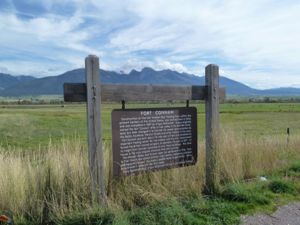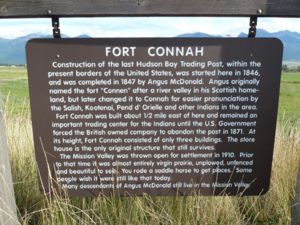Fort Connah: Difference between revisions
John Stanton (talk | contribs) m Text replace - "==ReplaceText Picture Gallery== {| cellspacing="5" width="800px" border="1" cellpadding="5" | |- valign="top" |width="33%" class="MainPageBG" style="border: 1px solid #c6c9ff; color: #000; background-color: #f0f0ff"| '''Click on the pictu |
John Stanton (talk | contribs) No edit summary |
||
| Line 44: | Line 44: | ||
* [http://fortconnah.info/index.html Fort Connah Website] | * [http://fortconnah.info/index.html Fort Connah Website] | ||
{{Visited|9 Oct 2010}} | {{Visited|22 Jul 2015, 9 Oct 2010}} | ||
__NOTOC__ | __NOTOC__ | ||
| Line 59: | Line 57: | ||
[[Category:Hudson's Bay Company Forts]] | [[Category:Hudson's Bay Company Forts]] | ||
[[Category:2010 Northern Trip]] | [[Category:2010 Northern Trip]] | ||
[[Category:2015 Research Trip]] | |||
Revision as of 15:30, 22 July 2015
|
Fort Connah (1847-1872) - Established in 1847 by Neil McArthur as the last Hudson's Bay Company fort/trading post in the United States. Also known as Flathead Post (3).
Fort Connah HistoryIn 1847 Angus McDonald was sent to complete the fort. When the fort closed down in 1872 the fur trade in Montana ended. Current StatusOne of the three original buildings still remains and is believed to be the oldest standing building in Montana. The site of Fort Connah is listed on the National Register of Historic Places. The remaining building is a hand-hewn, 375-square-foot log building that is the only surviving structure. The massive ten-inch-square hand-hewn beams are stacked horizontally to form the walls, the same type of construction used by the Hudson Bay Company. Aerial infrared scanning of the surrounding land shows tepee rings where Indians camped while trading.
See Also: Sources:
Links: Visited: 22 Jul 2015, 9 Oct 2010
| ||||||


